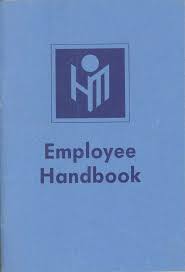An out-of-date employee handbook is more of a liability than an asset. With ever-evolving laws and regulations, it is important to ensure that your company’s handbook is current. When reviewing and revising your handbook, take heed of the following hot-button employment law topics.
Handbook Trouble Spots
The workplace-law changes coming from the Trump administration demand constant compliance vigilance from HR. Plus, the National Labor Relations Board just issued an important new ruling that forces employers to justify their handbook rules as lawful. Here are some current handbook trouble spots.
LGBT protections
Laws continue to expand protections afforded to lesbian, gay, bisexual and transgender (LGBT) employees. Courts uphold protection by Title VII’s protection against discrimination “because of sex”, including transgender individuals.
The EEOC recently filed two cases against employers alleging discrimination based on sexual orientation. Many states and municipalities also enacted laws and regulations expanding employment protections to include LGBT individuals. Given this trend, ensure that your equal employment opportunity policies provide equal protection to employees without regard to sex, sexual orientation, gender identity/expression or marital status.
Moreover, in light of the U.S. Supreme Court’s recent decision recognizing same-sex marriages requires you to provide same-sex married couples with the same benefits as heterosexual couples. Revise your policies on employee benefits and leaves of absence to ensure that same-sex couples receive equal treatment.
Pregnant Employees
The Pregnancy Discrimination Act (PDA) prohibits discrimination based on pregnancy in any aspect of employment. This includes hiring, firing, pay, job assignments, promotions, layoff, training, and benefits. The PDA also requires employers to treat pregnancy disability the same as other disabilities. Thus, employers provide sick leave and temporary disability benefits for pregnancy.
Likewise, you must provide reasonable accommodations for pregnancy-related disabilities. These accommodations should be based the same way you accommodate employees who are disabled for other reasons. Make sure your EEO policies include pregnancy in the list of protected categories. Likewise, double check that policies on accommodations include accommodating expectant workers.
Dress Codes and Religion
In June 2015, the U.S. Supreme Court decided that an employer can be liable for failing to accommodate a religious practice. Consequently, even if the employer lacks actual knowledge of a need for an accommodation, he or she is still liable.
The case was brought against Abercrombie & Fitch, which had a “Look Policy” that prohibited caps. A job applicant, who was a practicing Muslim, applied for a retail sales position. She wore a hijab to her interview. The district manager told the recruiter that the hijab violated the “Look Policy” and instructed her not to hire the applicant.
In light of this decision, ensure that your dress code policies are not biased against particular religious groups. According to the Court, even seemingly neutral policies like Abercrombie’s Look Policy are not discrimination-proof. Rather, Title VII gives religious practices “favored treatment”. It “requires otherwise-neutral policies to give way to the need for an accommodation” in the absence of undue hardship to the employer.
Smoke-free Policies
Review your policies against smoking in the workplace to account for changes in state laws involving marijuana use (both medicinal and recreational) and the increased use of e-cigarettes. Insure that policies expressly state that employees are prohibited from using or being under the influence of marijuana in the workplace.
Revise drug-testing policies to deal with employees who test positive for marijuana and claim a medicinal need for the drug. Smoking policies should expressly state that e-cigarettes are treated the same as other tobacco products.
“Concerted Activity”
Many companies unlawfully impress upon their employees that they cannot discuss wages, hours, and other terms of employment with others. The National Labor Relations Board recently reiterated that such handbook policies are overboard and illegal.
To avoid a National Labor Relations Act violation, define terms such as “confidential information” with specific examples. Expressly state that these policies never intended to limit employees’ ability to discuss employment conditions.
Multi-State Employers
Employers with employees in multiple states must consider legal variations in all the jurisdictions where they do business.
Numerous states and municipalities, for example, develop their own paid sick time rules. Some states provide family and medical leave laws beyond the federal FMLA requirements. Therefore, consider those state and local laws when drafting your policies and procedures. In addition, include a disclaimer specifying that legal requirements govern the final word in any case of inconsistencies between the handbook and the law of a particular authority.
 Final Note
Final Note
Distributing handbooks electronically provides many benefits. Yet, employers considering the web as the sole method of distribution should consider whether or not all

